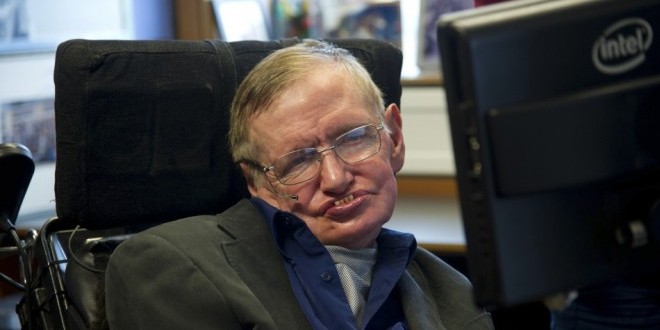Stephen Hawking has claimed victory in a bet with a rival scientist after an experiment indicated that his theories about the origins of the universe were correct.
Prof Hawking, director of research at Cambridge University’s Centre for Theoretical Cosmology, clinched bragging rights over former colleague Prof Neil Turok following American researchers’ discovery of evidence of cosmic ‘inflation’.
“It is another confirmation of inflation,” Hawking told BBC Radio 4. “It also means I win a bet with Neil Turok, director of the Perimeter Institute in Canada. The cyclic universe theory predicts no gravitational waves from the early universe.”
Turok said the terms of the bet were based on the findings of the Planck satellite, which was also looking for gravitational waves (and has not found them yet).
I’m not one to settle a dispute between two theoretical physicists, nor do I really care who wins a semantic argument for the grand prize of “bragging rights.” But, at this point, it’s easy to understand why Hawking was so anxious to claim victory: He’s sick of losing. And it seems like, at the most basic level, he was right this time. Turok’s theory is that the universe was born out of a series of big bangs; Hawking says that the gravitational waves observed by the Harvard team prove without a shadow of doubt that Turok’s theory is wrong.
The scientific wager is one that dates back at least a couple hundred years, and scientists have been making predictions since, well, science has existed. But Hawking seems to like making strange bets (and doing strange things like throwing time traveler parties) just for the hell of it. Maybe that’s why he’s the world’s funniest physicist.
Back in 1975, for some reason he bet Kip Thorne that black holes didn’t exist, which makes little sense because much of Hawking’s work is based on the idea that black holes do exist. When one was discovered, Hawking owed Thorne a year’s subscription to Penthouse.
In 1997, he teamed up with Thorne and made what is now known as the Thorne-Hawking-Preskill bet, with Thorne and Hawking suggesting that black holes swallow information forever and John Preskill saying that was nonsense. Hawking proved himself wrong in 2004, he gave Preskill a baseball encyclopedia. Hawking said that bet (and his previous theory about black holes) was his “biggest blunder” back in January.
But Hawking wasn’t done losing. In 2000, he bet University of Michigan physicist Gordon Kane $100 that the Higgs Boson “god particle” would never be found. Last year, it was, and he had to pay up.
With the resolution of his bet with Turok, it seems like he’s only got one big bet left—one from 2010 that he made with no one in particular. He bet that, if aliens were ever found, they would likely be hostile and it would be “too risky” for humans to interact with them (if killer robots don’t get us first). Let’s hope he returns to his losing ways.
Agencies/Canadajournal
 Canada Journal – News of the World Articles and videos to bring you the biggest Canadian news stories from across the country every day
Canada Journal – News of the World Articles and videos to bring you the biggest Canadian news stories from across the country every day




What makes Hawkings so smart anyway? Why should I care about his bets?
I personally am sick of hearing from this A hole. He thinks he is incredibly smart. A lot of his”findings” are moronic
His basic intelligence is what makes him smart just as your intelligence obviously makes you the opposite based on your comment.